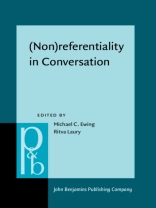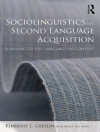Although there is a large literature on referentiality, going back to at least the nineteenth and early twentieth century, much of this early work is based on constructed data and most of it is on English. The chapters in this volume contribute to a growing body of work that examines referentiality through naturalistic data in context. Taking an interactional approach to (non)referentiality, contributors to this volume ask how participants talk in real time about persons and things as individuals or as categories, and what distinguishes ‘referential’ from ‘nonreferential’, ‘specific’ from ‘nonspecific’, and ‘generic’ from ‘nongeneric’. Crucially, we ask whether these distinctions even matter to participants in conversation, and if they do, what the evidence for that would be. Contributors investigate these issues using data from conversational interaction in a variety of social contexts – including between close friends and family to more casual acquaintances, in service encounters, and between adults and children – and in a range of languages: English, Finnish, French, Indonesian, Japanese and Mandarin. Collectively, the chapters develop insights showing that reference is often fluid, dynamic, and indeterminate, that referential indeterminacy is typically unproblematic for participants, that shifts in referentiality tend to be tied to specific social goals, and that reference and referentiality emerge dialogically and interactionally.
Ewing Michael C. Ewing & Laury Ritva Laury
(Non)referentiality in Conversation [EPUB ebook]
(Non)referentiality in Conversation [EPUB ebook]
ซื้อ eBook เล่มนี้และรับฟรีอีก 1 เล่ม!
ภาษา อังกฤษ ● รูป EPUB ● หน้า 215 ● ISBN 9789027247049 ● บรรณาธิการ Ewing Michael C. Ewing & Laury Ritva Laury ● สำนักพิมพ์ John Benjamins Publishing Company ● การตีพิมพ์ 2024 ● ที่สามารถดาวน์โหลดได้ 3 ครั้ง ● เงินตรา EUR ● ID 9523473 ● ป้องกันการคัดลอก Adobe DRM
ต้องใช้เครื่องอ่านหนังสืออิเล็กทรอนิกส์ที่มีความสามารถ DRM












